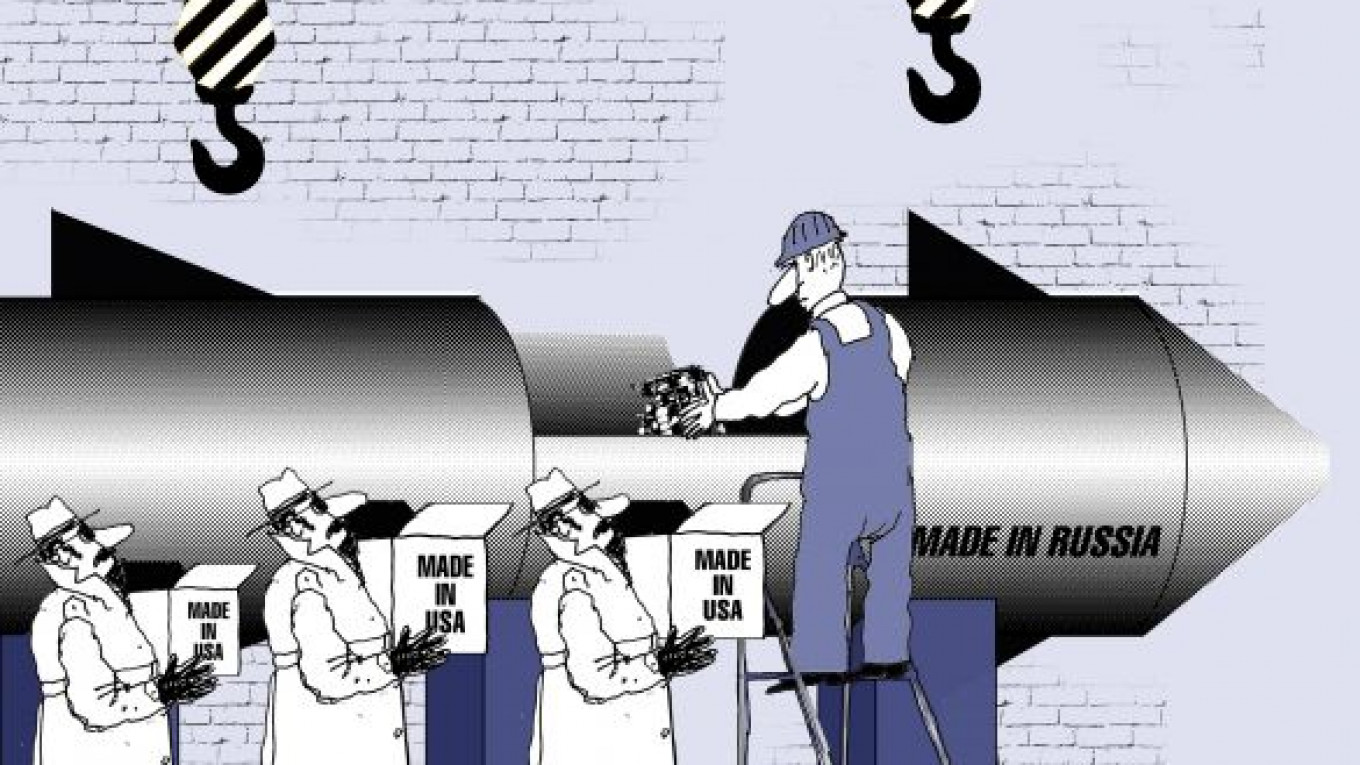Among all the senior officials, only Deputy Prime Minister Dmitry Rogozin felt it necessary to respond to the FBI's arrest of former Russian nationals in the United States on charges of illegally exporting advanced electronics to Russia. Although Rogozin denied that any such shipments had occurred, he also said, "If we start saying publicly that we have a shortage of certain imported components, our oxygen will be cut off and their delivery will be cut off." Rogozin effectively admitted that deliveries of contraband do take place.
When the FBI arrested members of a Russian spy ring two years ago, it did not understand what the sleeper agents had been up to for more than a decade other than enjoying their U.S. ??u?pper?-?middle-class lifestyles on Russia's tab. This time the situation is far more transparent. Alexander Fishenko and 10 other colleagues who worked at Houston-based Arc Electronics are charged with working as unregistered agents and illegally exporting advanced electronics to Russia. Those components were reportedly used in the targeting systems of modern Russian weapons, avionics for combat aircraft and other projects that the Federal Security Service's secret Military Division 35533 laboratory had ordered.
But it seems that Fishenko and his partners were remarkably careless. According to the FBI, they exchanged candid e-mails with Russian buyers without taking any precautions whatsoever. For example, one Arc employee involved in the illegal exports repeatedly warned a Russian buyer that the equipment he had requested was on a list of products prohibited from export or else required special licensing. At the same time, he openly boasted in e-mails that he knew how to circumvent U.S. export-restriction laws. In addition, other employees openly stated in their correspondence that they had fabricated documents.
The way Russia tries to obtain intelligence and technology says much about the country. More than anything else, the use of sleeper agents showed that the Kremlin and its intelligence agencies were still stuck in 1950s-era thinking, despite the fact that the existence of nuclear weapons made it clear by the 1960s that this type of reconnaissance was unnecessary.
Perhaps, however, there is a better explanation: The intelligence network was set up to launder money for a group of senior Moscow officials. Thus, the illegal network was either set up to satisfy the wildly Cold War-era imperial aspirations of Russia's top brass, or else it was an illegal means of personal enrichment for powerful Russian officials.
Corruption coupled with weak attempts to imitate being a superpower have become the defining features of President Vladimir Putin's 12-year rule.
The current smuggling scandal demonstrates another important aspect of Putin's Russia. According to the FBI, U.S. electronic components were installed in MiG aircraft, air defense systems, anti-ship weaponry and secret electronic devices created by the FSB. This is what marks the fundamental difference between the way Russia carries out industrial espionage today and how it did so under Josef Stalin. Spies working under Stalin obtained the technology behind the components and spent insane amounts of money to manufacture these products domestically. Today, China follows this same pattern, manufacturing knockoffs of Western components.
By contrast, Russia can't pull off what the Chinese have done. Instead, Russia buys contraband electronic components. When these supplies run out, the country simply buys more. Nobody even attempts to manufacture those parts because Russia is incapable of implementing serial production of advanced electronic components in the country. One senior official from the defense sector interviewed by Interfax said 60 to 70 percent — and in some areas, up to 95 percent — of all electronics used in Russia's defense equipment are purchased abroad.
The best explanation for this is that producing it domestically is unprofitable. In the current Russian economy, it makes much more economic sense to have a few dozen firms acting as middlemen to buy the necessary electronics from all over the world — legally or illegally, if necessary.
The much-discussed 20 trillion ruble ($644 billion) rearmament program though 2020 is supposed to finally introduce serial production in the country's military production chain. But sooner or later, it will become evident that the new "advanced weapons" Russia is supposed to produce will be missing the electronics needed to make them work.
Still, does anyone really believe that serial production will ever implemented? Isn't the real goal to embezzle as much money as possible by promising to flood the army with modern equipment? To procure that government funding in the first place, military officials have to demonstrate the occasional "miracle" weapon that functions with the help of smuggled electronics.
Alexander Golts is deputy editor of the online newspaper Yezhednevny Zhurnal.
Related articles:
A Message from The Moscow Times:
Dear readers,
We are facing unprecedented challenges. Russia's Prosecutor General's Office has designated The Moscow Times as an "undesirable" organization, criminalizing our work and putting our staff at risk of prosecution. This follows our earlier unjust labeling as a "foreign agent."
These actions are direct attempts to silence independent journalism in Russia. The authorities claim our work "discredits the decisions of the Russian leadership." We see things differently: we strive to provide accurate, unbiased reporting on Russia.
We, the journalists of The Moscow Times, refuse to be silenced. But to continue our work, we need your help.
Your support, no matter how small, makes a world of difference. If you can, please support us monthly starting from just $2. It's quick to set up, and every contribution makes a significant impact.
By supporting The Moscow Times, you're defending open, independent journalism in the face of repression. Thank you for standing with us.
Remind me later.


